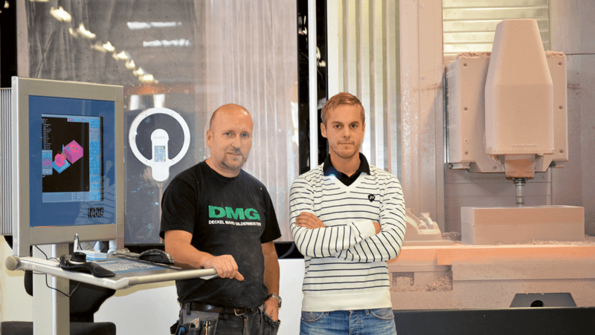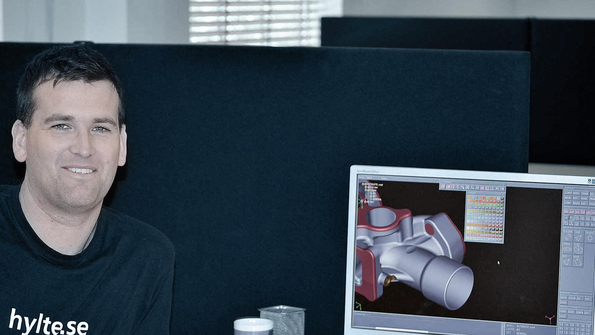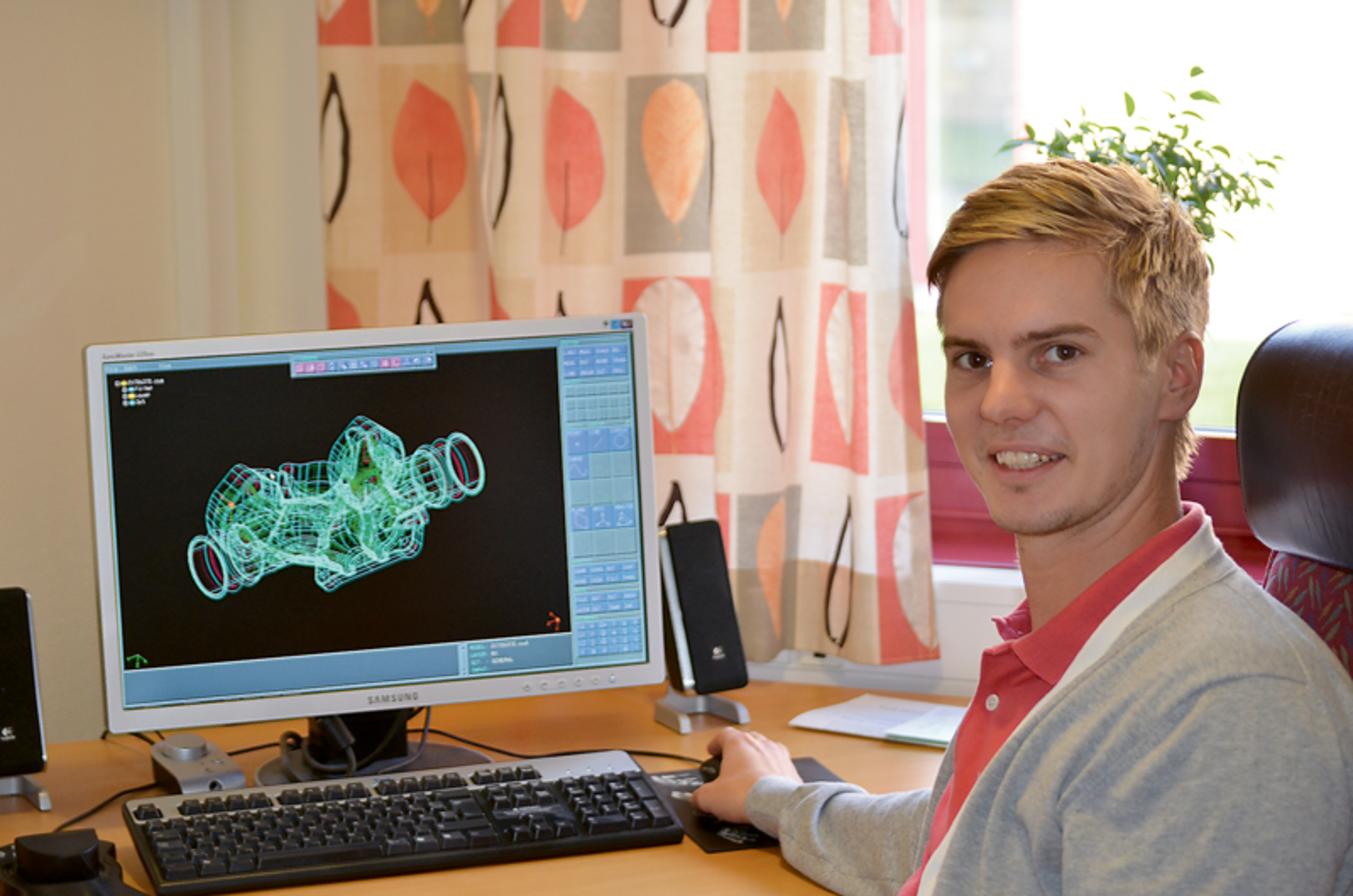-
Software
-
CAM software
- Tebis Automill
- CNC programming
- CNC automation
- CNC simulator
- Multiple setup
- Robotic machining
- CNC drilling
- Deep-hole drilling
- Combined turn-milling
- CNC turning
- Turn-milling
- 2.5D milling
- 3D milling
- 5-axis milling
- Slot milling
- Trimming
- HPC milling
- HFC milling
- Circle-segment cutters
- Sinker EDM
- Wire EDM
- 3D laser cutting
- Laser hardening
- Laser weld cladding
- CAD software
- CAQ software
- MES software
- Products
-
CAM software
- Services
- Consulting
- Sectors
- References
- Company
- News

-
 Home References
Home ReferencesExpertise in the workshop
Company
Unnaryd Modell AB
Location
Unnaryd, Sweden
Focus
Making the manufacturing process simpler and more efficient
Benefits:
- Storing manufacturing expertise in templates
- Optimizing interactions between design and manufacturing
- Increasing production capacity
Sector
Model making
Published
2013

Interviewee: Martin Larsson, Managing director
"Thanks to the investment (in Tebis), we’ve increased our production capacities in model manufacturing by 10 to 15% and in manufacturing by 20 to 25%.
Martin Larsson, Unnaryd Modell AB, Unnaryd, SwedenThanks to automated manufacturing processes, the Swedish company Unnaryd Modell AB achieves first-class results.
At Unnaryd Modell AB, the machine operators do their own programming. As soon as a digital 3D model is available, the data is processed directly in the shop for efficient and precise milling. "Every workplace at the machine has its own Tebis CAM workstation," says Martin Larsson, the production manager.
When Unnaryd Modell was founded 30 years ago, Lars-Ingvar Larsson was already convinced that the key to success lay in perfect details and high professional expertise. And he was proven right: from a small workshop in his garage, his business has grown into a company well-known beyond Sweden's borders.
Although the founder has passed the reins to his sons Daniel, Martin, and Stefan, it is far too early for him to fully retire from the business. As the spokesperson for the board, he is responsible for special projects. In addition, two years ago he founded UMAB Casting, a company specializing in sand casting, in order to realize another personal dream.
At the start of the process chain: the physical model
Unnaryd Modell specializes in manufacturing models, prototypes and batch production for the automotive sector – from small car interior details to large chassis components. "We are a well-established supplier for the Swedish automotive and engineering industries," says Stefan Larsson, head of Sales and Marketing. Using a 3D model as a base, the company performs high-speed milling of prototypes, obtaining a surface roughness of 2 µm even without reworking or finishing. The advantage is obvious: Because deficiencies in the part can already be detected at the prototype stage, significant time and money can be saved.
In order to meet these requirements on a daily basis, even under great time pressure, Unnaryd Modell uses the right technology such as powerful software, modern machine tools and the appropriate special tools. However, its employees continue to be the most important resource. Because even the best technology isn't worth anything without qualified personnel who can fully utilize this technology on the basis of profound expertise, apply it as required and accurately evaluate the results.
The shop contains 11 Tebis workstations
"In contrast to earlier times, the machine operators themselves are now responsible for job planning, NC programming and evaluating surface quality. The fact that they now have more responsibility and can independently organize their processes was very well received by the employees," says Martin Larsson, the production manager. "Of course, this also has more than positive effects on the results of the work."
 Machine operator Leif Andersson and production manager Larsson demonstrate hardware and software: the DMG multifunction machine, with which larger workpieces – both casting and design models – are now also machined simultaneously in 5 axes, is next to the Tebis workstation.
Machine operator Leif Andersson and production manager Larsson demonstrate hardware and software: the DMG multifunction machine, with which larger workpieces – both casting and design models – are now also machined simultaneously in 5 axes, is next to the Tebis workstation.Lead times
How is the lead time reduced, and how is manufacturing structured more efficiently?
 CAD specialist Ronny Löfqvist demonstrates how he designs machining allowances for cast parts in Tebis.
CAD specialist Ronny Löfqvist demonstrates how he designs machining allowances for cast parts in Tebis.The new method of operation has considerably simplified the manufacturing process, from the document to production. Thanks to the redistribution of tasks, the designers’ and machine operators’ expertise interacts significantly better. Existing manufacturing expertise is optimally utilized. This can only work with the powerful software that stores all data in a central database. This means that the employees can access not only all information related to manufacturing, but also the specialist expertise of their colleagues. As Martin Larssen tells us, Unnaryd Modell fully relies on Tebis software: "We have always been satisfied with Tebis in the CAM environment. But the software now also offers many options in the CAD environment that significantly simplify subsequent NC programming. And it offers a multitude of functions for smoothing paths and curves. Even complex surface structures can be easily designed. We currently have 13 CAM licenses, five CAD licenses and two Tebis Viewers. To use just one system for CAD and CAM projects is absolutely faster and more effective. After all, we no longer need to switch between different systems or convert files."
How do CAD/CAM systems accelerate the manufacturing processes?
"With the Tebis job manager, structures and processes can be mostly automated. Manufacturing processes can therefore be more easily controlled and are faster, more reliable and more cost-effective," explains Larsson. "The ability to change the part even after the test phase is also a great benefit for us," adds Martin. "It’s very reassuring to know that the geometry can be adjusted without having to fully reprogram the part."
Well-prepared for the future
With the goal of continuously expanding its product portfolio, Unnaryd Modell counts on new employees, new technologies and new machines. In 2011, for example, the company added two machine operators to its team and added a DMF 260 5-axis traveling-column machine to its machinery. It now also uses a robot cell from System 3R that’s connected to a milling machine from the same company. And it expanded its internal foundry in order to better benefit from the increased machine capacity. Today the company covers the entire production chain, from the design to the tested prototypes. Unnaryd Modell also develops control and instrumentation devices.
"Thanks to our investment, we’ve increased our production capacity in model manufacturing by 10 to 15% and in manufacturing by 20 to 25%. Because we now manufacture larger models and tools, we’ve also become more competitive in these sectors," says Larsson.
Per Gisslar, who has managed the activities of Tebis Scandinavia AB since 1992, also sees the company's future as a very positive one. "The success of Unnaryd Modell is certainly based on their expertise, as well as their awareness of the key role of a production process that continuously evolves to follow the latest standards. Because the company uses Tebis AutoMill® to manage its entire manufacturing expertise, all information is retained. The company is now optimally positioned for staying competitive in a global market."
 Stefan Larsson at his workstation. Like all employees at Unnaryd Modell, he has filled a wide range of roles. "I've tried it all: operating machines, design, programming, dimensioning and much more."
Stefan Larsson at his workstation. Like all employees at Unnaryd Modell, he has filled a wide range of roles. "I've tried it all: operating machines, design, programming, dimensioning and much more."

